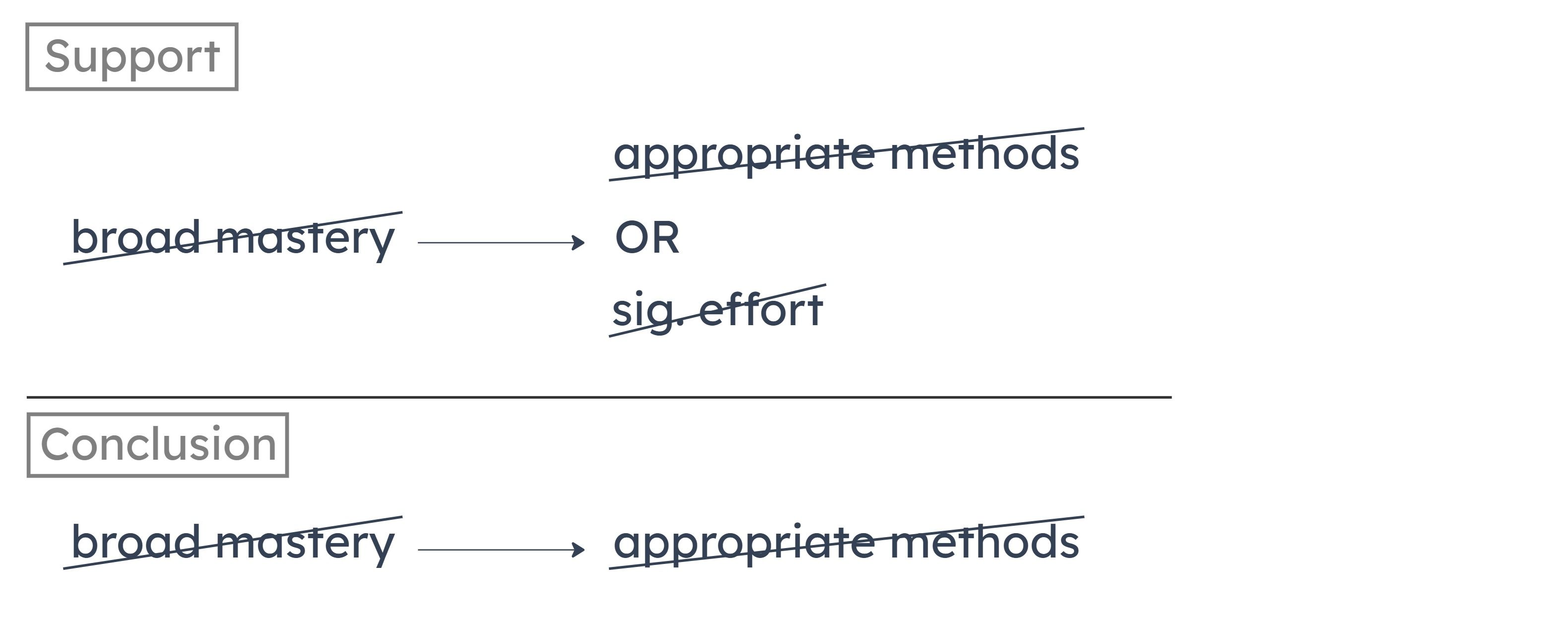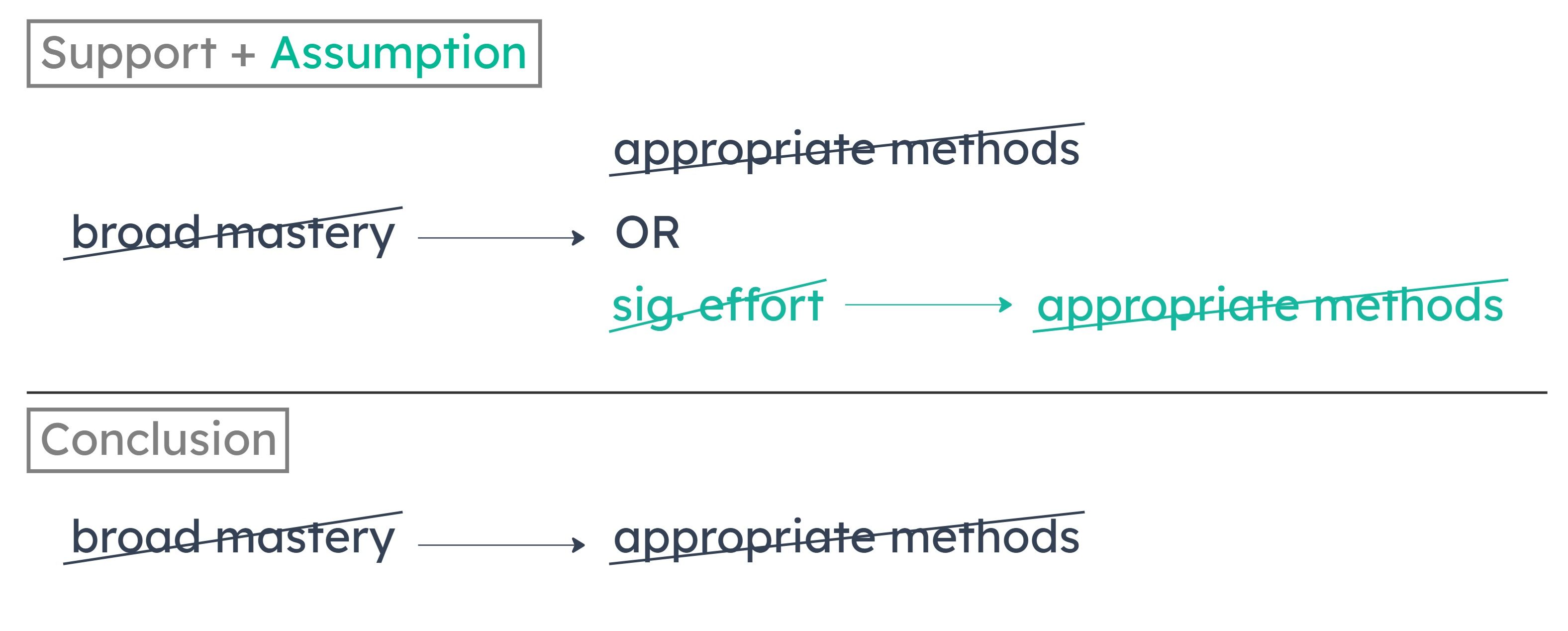LSAT 140 – Section 3 – Question 11
LSAT 140 - Section 3 - Question 11
December 2013You need a full course to see this video. Enroll now and get started in less than a minute.
Target time: 1:47
This is question data from the 7Sage LSAT Scorer. You can score your LSATs, track your results, and analyze your performance with pretty charts and vital statistics - all with a Free Account ← sign up in less than 10 seconds
| Question QuickView |
Type | Tags | Answer Choices |
Curve | Question Difficulty |
Psg/Game/S Difficulty |
Explanation |
|---|---|---|---|---|---|---|---|
| PT140 S3 Q11 |
+LR
| Sufficient assumption +SA Conditional Reasoning +CondR Link Assumption +LinkA | A
59%
167
B
13%
160
C
14%
161
D
1%
159
E
13%
163
|
146 160 174 |
+Hardest | 149.74 +SubsectionMedium |
J.Y.’s explanation
You need a full course to see this video. Enroll now and get started in less than a minute.
Video of JY doing this
You need a full course to see this video. Enroll now and get started in less than a minute.
Summary
The conclusion is that if broad mastery isn’t achieved, it must be that the students aren’t taught with appropriate methods. As support, the author gives a conditional premise: appropriate methods, combined with significant effort, lead to broad mastery. (Contrapositive: if broad mastery isn’t achieved, there either weren’t appropriate methods or there wasn’t significant effort.)


Missing Connection
The premise says that a lack of broad mastery means one of two things: a lack of appropriate methods or a lack of significant effort. But the conclusion is that broad mastery means one thing only: a lack of appropriate methods.
The conclusion would follow if we assumed that when there’s a lack of significant effort, there must also be a lack of appropriate methods. In that case, no matter what, a lack of broad mastery always means a lack of appropriate methods.
The conclusion would follow if we assumed that when there’s a lack of significant effort, there must also be a lack of appropriate methods. In that case, no matter what, a lack of broad mastery always means a lack of appropriate methods.
A
As long as secondary school students are taught with methods appropriate to their learning styles, they will devote significant effort to their studies.
Contrapositive: if students don’t devote significant effort, it must be that they’re not taught with appropriate methods. This means that no matter what, a lack of broad mastery means that student’s aren’t being taught with appropriate methods.


B
Even if secondary school students are taught with methods appropriate to their learning styles, they will not achieve broad mastery of the curriculum if they do not devote significant effort to their studies.
This says a lack of significant effort is sufficient for a lack of broad mastery. But this doesn’t change the argument’s core problem: a lack of broad mastery can mean either a lack of appropriate methods or a lack of significant effort. We’re still no closer to the conclusion.
C
Secondary school students do not achieve broad mastery of the curriculum if they are not taught with methods appropriate to their learning styles.
This says a lack of appropriate methods is sufficient for a lack of broad mastery. But this doesn’t change the argument’s core problem: a lack of broad mastery can mean either a lack of appropriate methods or a lack of significant effort. We’re still no closer to the conclusion.
D
Teaching secondary school students with methods appropriate to their learning styles does not always result in broad mastery of the curriculum by those students.
This breaks the argument. If appropriate methods aren’t sufficient for broad mastery, then the author can’t possibly conclude that a lack of broad mastery always implies a lack of appropriate methods.
E
Secondary school students who devote significant effort to their studies do not always achieve broad mastery of the curriculum.
So significant effort isn’t sufficient on its own for broad mastery. This doesn’t affect the argument, which says significant effort is sufficient if combined with appropriate methods. It’s still possible a lack of broad mastery sometimes implies a lack of significant effort.
Take PrepTest
Review Results
LSAT PrepTest 140 Explanations
Section 1 - Logical Reasoning
- Question 01
- Question 02
- Question 03
- Question 04
- Question 05
- Question 06
- Question 07
- Question 08
- Question 09
- Question 10
- Question 11
- Question 12
- Question 13
- Question 14
- Question 15
- Question 16
- Question 17
- Question 18
- Question 19
- Question 20
- Question 21
- Question 22
- Question 23
- Question 24
- Question 25
Section 2 - Logical Reasoning
- Question 01
- Question 02
- Question 03
- Question 04
- Question 05
- Question 06
- Question 07
- Question 08
- Question 09
- Question 10
- Question 11
- Question 12
- Question 13
- Question 14
- Question 15
- Question 16
- Question 17
- Question 18
- Question 19
- Question 20
- Question 21
- Question 22
- Question 23
- Question 24
- Question 25
- Question 26
Section 3 - Logical Reasoning
- Question 01
- Question 02
- Question 03
- Question 04
- Question 05
- Question 06
- Question 07
- Question 08
- Question 09
- Question 10
- Question 11
- Question 12
- Question 13
- Question 14
- Question 15
- Question 16
- Question 17
- Question 18
- Question 19
- Question 20
- Question 21
- Question 22
- Question 23
- Question 24
- Question 25
- Question 26
Leave a Reply
You must be logged in to post a comment. You can get a free account here.